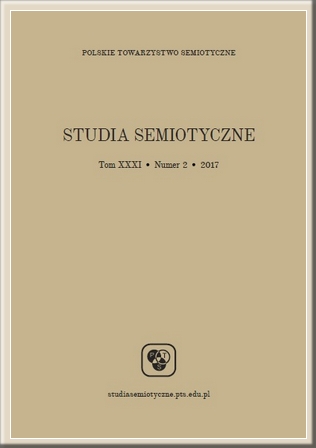Abstract
DOI: http://doi.org/10.26333/sts.xxxi2.09
Our approach to the liar paradox is based on the Wittgensteinian approach to semantic and logical paradoxes. The main aim of this article is to point out that the liar sentence is only seemingly intelligible, and that it has not been given any sense. First, we will present the traditional solutions of the paradox, especially those which we call modificational. Then we will determine what the defects of these solutions are. Our main objection is that the modificational approaches assume that we can express in languages certain senses which are improper. Next, we will explain why we think that the liar sentence is a mere nonsense. This sentence does not have any role in any language game – it is completely useless. We will also respond to several objections to our approach. 1. That it is not consistent with the principle of compositionality of sense. 2. According to the Quineian philosophy of logic, paradoxical sentences can be conceived as false assumptions leading to crises of logical paradigms. 3. The liar sentence seems to be, contrary to our approach, intelligible.
References
Beall, J. C. (2001). A Neglected Deflationist Approach to the Liar. Analysis, 61(2), 126–129.
Blackburn, S. (1984). Spreading the Word. Oxford: Oxford University Press.
Bochvar, D. A. (1938). Ob odnom trechznachnom ischislenii i yego primienienii kanalizu paradoksov klassicheskogo passhirennogo funktsionalnogo ischiclenya (On a three-valued logical calculus and its application to the analysis of contradictions). Matematicheskiy sbornik, 4(46):2, 287–308.
Bronzo, S. (2011). Context, Compositionality and Nonsense in Wittgenstein’s Tractatus. In R. Read and M. Lavery (Eds.), Beyond the Tractatus Wars (pp. 84– 111). London: Routledge.
Conant, J. (2000). Elucidation and Nonsense in Frege and Early Wittgenstein. In A. Crary and R. Read (Eds.), The New Wittgenstein (pp. 174–217). London–New York: Routledge.
Diamond, C. (1991). What Nonsense Might Be. In The Realistic Spirit – Wittgenstein, Philosophy, and the Mind (pp. 95–114). Cambridge, Mass–London: The MIT Press.
Dummett, M. (1987). Reply to John McDowell. In Michael Dummett: Contributions to Philosophy, B. Taylor (Ed.) (pp. 253–268), Dordrecht: Martinus Nijhoff.
Fraassen, B.C. van (1968). Presupposition, Implication and Self-Reference. Journal of Philosophy, 65, 136–152.
Frege, G. (1959). Foundations of Arithmetic: A Logical-Mathematical Enquiry Into the Concept of Number. Transl. J. L. Austin. Evanston (IL): Northwestern University Press.
Gawroński A. (2004). Tzw. «Zdanie kłamcy» jako rekurencyjna funkcja zdaniowa. Studia Semiotyczne, 25, 33–57.
Gawroński A. (2011). Wizja i argumentacja w filozofii. Od lektury Homera do teorii metatekstu. Kraków: Znak.
Geach P. (1971). Mental Acts: Their Content and Their Objects. London–New York: Routledge–Kegan Paul.
Goldstein, L. (1988). Wittgenstein’s Late Views on Belief, Paradox and Contradiction. Philosophical Investigations, 11(1), 49–73.
Goldstein, L. (2000). A Unified Solution to Some Paradoxes. Proceedings of the Aristotelian Society, 100, 53–74.
Goldstein, L. (2009). A Consistent Way With Paradox. Philosophical Studies, 144, 377–389.
Gomułka, J. (2016). Rachunek. Filozofia nauk formalnych i jej związek z koncepcją podmiotu we wczesnym i średnim okresie twórczości Ludwiga Wittgensteina. Kraków: WN UPJPII.
Gumański, L. (1990). Wprowadzenie w logikę współczesną. Warszawa: PWN.
Leśniewski, S. (1991). The Critique of the Logical Principle of the Excluded Middle.
Transl. S. J. Surma, J. Wójcik. In Collected Works, Vol. 1, eds. S. J. Surma, J. T. Srzednicki, D. I. Barnett (pp. 47–85). Warsaw–Dordrecht: PWN, Kluwer.
Moyal-Scharrock, D. (2004). The Third Wittgenstein: The Post-Investigations Works. Aldershot: Ashgate.
McDowell J. (1998). Another Plea for Modesty. In Meaning, Knowledge, and Reality (pp. 108–131). Cambridge, Mass.: Harvard University Press.
Pelletier, F. J. (1994). The Principle of Semantic Compositionality. Topoi, 13(1), 11–24.
Peregrin, J. (2005). Is Compositionality an Empirical Matter? In M. Werning, E. Machery, G. Schurz (Eds.), The Compositionality of Meaning and of Content, Vol. 1 Foundational Issues (pp. 231–246). Frankfurt: Ontos Verlag.
Priest, G., (1987). Unstable Solutions to the Liar Paradox. In S. J. Bartlett and P. Suber (Eds.), Self Reference: Reflections and Reflexivity (pp. 145–175), Dordrecht: Nijhoff.
Quine W. V. O. (1986). Philosophy of Logic, 2nd edition. Cambridge (MA), London: Harvard University Press.
Quine, W. V. O. (1980). From a Logical Point of View. Cambridge (MA), Harvard University Press.
Rorty, R. (1983). Philosophy and the Mirror of the Nature. Oxford: Blackwell.
Russell, B. (1908). Mathematical Logic as Based on the Theory of Types. American Journal of Mathematics, 30, 222–262.
Ryle, G. (2009). A Concept of Mind. London–New York: Routledge.
Stegmüller, W. (1955). Die Antinomien und ihre Behandlung. Insbrucker Beiträge zur Kutlurwissenschaft, 3, 27–40.
Tarski, A. (1944) The Semantic Conception of Truth and the Foundations of Semantics. Philosophy and Phenomenological Research, 4(3), 341–376.
Tworak, Z. (2004). Kłamstwo kłamcy i zbiór zbiorów. O problemie antynomii. Poznań: WN UAM.
Wawrzyniak, J. (2011). Paradoks kłamcy. Analiza i Egzystencja, 15, 161–179.
Wawrzyniak, J. (2015). Znaczenie i wartość w filozofii Johna McDowella i Barry’ego Strouda. Przedmiot refleksji czy redukcji? Kraków: Księgarnia Akademicka.
Witherspoon, E. (2000). Carnap and Wittgenstein. In A. Crary and R. Read (Eds.), The New Wittgenstein (pp. 315–349), London, New York: Routledge.
Wittgenstein, L. (1961) Tractatus Logico-Philosophicus. Transl. B. McGuinness and D. Pears. London: Routledge.
Wittgenstein, L. (1976). Wittgenstein’s Lectures on the Foundations of Mathematics, Cambridge, 1939. Ed. C. Diamond. Chicago, London: The University of Chicago Press.
Wittgenstein, L. (1978). Remarks on the Foundations of Mathematics. Transl. G. E. M. Anscombe, eds. G. H. von Wright, R. Rhees, G. E. M. Anscombe, third Edition. Oxford: Blackwell.
Wittgenstein, L. (1972). On Certainty. Transl. D. Paul, G. E. M. Anscombe. New York: Harper Torchbook.
Wittgenstein, L. (1974). Philosophical Investigations. Transl. G. E. M. Anscombe. Oxford: Blackwell.
Wright, G.H. von, (1988). Comments and Reflections. In N. Incardona (Ed.), Les forms actuelles du vrai (pp. 185–199). Palermo: Enchridion.


